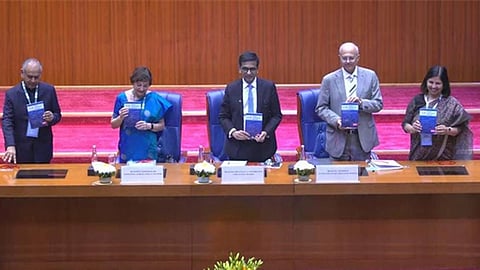
- News
- Columns
- Interviews
- Law Firms
- Apprentice Lawyer
- Legal Jobs
- हिंदी
- ಕನ್ನಡ

The journal of the Delhi International Arbitration Centre (DIAC), 'Delhi Arbitration Review' was released on Wednesday at the inauguration session of Delhi Arbitration Weekend (DAW), 2024.
The journal was released by Chief Justice of India (CJI) DY Chandrachud in the presence of Justices Judith Prakash, Manmohan, Vibhu Bakhru and Rekha Palli, at the inauguration of DAW held at the Supreme Court auditorium.
The session, titled ‘Understanding the Unsaid: Biases in Arbitration and the Role of Tribunals and Courts’, was attended by acting and retired judges, government law officers, Senior Advocates, advocates and arbitrators.
The session opened with a welcome address by the Acting Chief Justice Manmohan of Delhi High Court. He presented his views on the theme of the session and remarked that the efficacy of the judicial system is an important distinguishing feature for the success of arbitration processes.
"It is a known fact that the practice of arbitration is not uniform across all jurisdictions. Apart from domestic regulatory concerns, one of the most crucial factors distinguishing one jurisdiction from another is the efficacy of judicial systems. Therefore, the importance of a confluence of the best of minds, for sharing best practices in the field, cannot be undermined," he said.
He touched upon two aspects that make up the contours of the issue of bias in arbitration. The first was the disqualification of an arbitrator on the ground of “apparent bias”. The second, not having anything to do with disqualification, was ‘systemic bias’.
Based on recent developments, he opined that India’s lawmakers and judges are paying special attention to the issue of “apparent bias” in arbitration.
He deemed it ironic that while trade and commerce is international, the Global South is playing a minimalistic role in lending its voice to dispute resolution in arbitrations.
"An inclusive role is essential to counter-balance systemic bias," he added.
In the keynote address presented by Justice Judith Prakash of Singapore Supreme Court, she unpacked the theme of the session while focusing on apparent bias and institutional/ systemic bias. She discussed legal principles and practices concerning biases in international arbitrations while focusing on precedents that shape the jurisprudence of bias in India and Singapore.
The inaugural session concluded with the plenary address by CJI DY Chandrachud, who presented his thoughts on the issues of diversity in the selection of arbitrators and its direct correlation to addressing issues of bias.